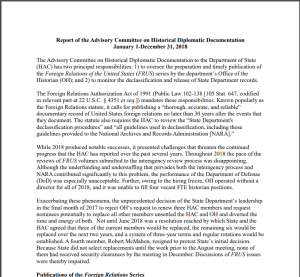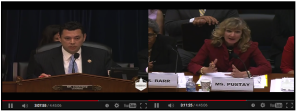State Dept.’s Annual Historical Advisory Committee Report Slams DOD’s FRUS Performance – Again. FRINFORMSUM 9/26/2019
 State Dept. Calls DOD’s FRUS Efforts Negligent and Egregious
State Dept. Calls DOD’s FRUS Efforts Negligent and Egregious
For the second year in a row, the State Department’s Historical Advisory Committee (HAC) takes the Defense Department to task for its poor performance regarding its obligation to declassify select documents for the Foreign Relations of the United States series. In its annual report for 2018, the HAC says “once again the Department of Defense in 2018 performed so negligently and so egregiously violated the requirements mandated by the Foreign Relations statute that it more than offset the commendable efforts of the other agencies and departments.” (emphasis added) The HAC also cited the State Department’s 2017 rejection of the Office of the Historian’s request to renew three HAC members as a hindrance to the FRUS’s publication.
The FRUS series is statutorily obligated to publish a “thorough, accurate, and reliable” record of US foreign policy “no later than 30 years after the events that they document.” Steve Aftergood notes that, “To a large extent, FRUS is dependent on — and also helps to motivate — declassification of national security and foreign policy records. Such declassification in turn depends on the cooperation of other agencies who are called upon to review selected documents.”
HAC also expressed concerns about the National Archives and Records Administrations and the State Department’s Office of Information Programs and Services ability to manage the growing volume of electronic records, and warns that “insufficient funding, the lack of an appropriate secure space, and inadequate technology has incapacitated IPS’s reviews of central file P- and N-reels from the 1980 on, the quality of which is rapidly deteriorating.”
There were successes, however. The office published six FRUS publications (down from eight last year). These volumes are:
- FRUS, 1969–1976, Volume XIX, Part 2, Japan, 1969–1972
- FRUS, 1917–1972, Volume VIII, Public Diplomacy, 1969–1972
- FRUS, 1977–1980, Volume XVII, Part 2, Sub-Saharan Africa
- FRUS, 1917–1972, Volume VII, Public Diplomacy, 1964–1968
- FRUS, 1977–1980, Volume XXIV, South America; Latin America Region
- FRUS, 1977–1980, Volume XII, Afghanistan
The Historian’s Office also “completed its 10-year project to digitize and post online at history.state.gov all 512 back catalogue FRUS volumes dating back to the series’ origin in 1861. Each volume is fully-searchable and downloadable in multiple formats. Notwithstanding the difficulties, OH now plans to digitize all the microfiche supplements.”
The report praises the leadership of the IPS and the National Security Council’s Office of Access Management, as well as the Department of Energy, which improved its review despite the onerous page-by-page Kyl-Lott review requirements of documents for Restricted and Formerly Restricted Data, the “guidelines for which are ambiguous.” The report also notes that in 2018 the CIA did demonstrate its commitment towards its FRUS obligations, though expressed concern that the CIA’s Historical Review Panel did not convene a meeting in 2018, despite meeting twice annually in previous years.
New Info on the FBI’s Use of National Security Letters
A FOIA lawsuit has won the release of FBI documents showing that the bureau has used National Security Letters to “obtain personal data from far more companies than previously disclosed.” The newly-released documents are letters terminating the gag orders that accompany national security letters (NSLs demand business records from a wide array of organizations for national security investigation and have been a long-standing concern for privacy advocates in part because of their insufficient judicial oversight and draconian nondisclosure agreements). The FBI tried to argue in court that even releasing the termination letters for the gag orders “could allow criminals and terrorists to learn sensitive information about the FBI’s investigative techniques.” But Judge Vince Chhabria of the Northern District of California found the FBI’s argument “dubious” and ruled in favor of the Electronic Frontier Foundation, which shared the documents with the New York Times.
 JTF-Ares: Hacking ISIS
JTF-Ares: Hacking ISIS
NPR’s Dina Temple-Raston’s “How the U.S. Hacked ISIS” is adding more information to the public record on Joint Task Force ARES and Operation Glowing Symphony, the U.S. Cyber Command’s attempts to curtail ISIS’s ability to use and exploit the internet. The piece relies on interviews with half a dozen people directly involved in the operation, and is an invaluable companion read to the National Security Archive Cyber Vault’s collection of FOIA-released records on JTF-ARES and Glowing Symphony, which shows the evolution of the US approach and “allows for at least a partial, preliminary judgment about the operation’s success.”
Are you a researcher interested in journalism and cybersecurity? If so, join us for a FOIA workshop specially curtailed for you on October 24.
Private Firms Profiting From ICE Detention Centers
FOIA records obtained by the National Immigrant Justice Center provide a “rare glimpse into dealings between private detention companies and government officials.” The documents include emails between senior officials at the for-profit Immigration Centers of America and the town treasurer of Farmville, Virginia, where ICA has a facility. Emailed invoices show that ICA charged Farmville around $2 million a month, of which the town of Farmville netted around $200,000 in profit. Jesse Franzblau, a senior policy analyst at NIJC, told Roll Call that “Taken altogether, the paper trail really shows this profit-driven incentivization for mass incarceration of immigrants.”
Letelier-Moffitt Assassination: State Department Officials Pushed for Pinochet’s Ouster
In the aftermath of the September 21, 1976, car-bombing that killed former Chilean ambassador Orlando Letelier and his colleague, Ronni Moffitt, in Washington D.C., four State Department officers began pressing for a policy to force General Augusto Pinochet from power, according to a declassified “Dissent Channel” memorandum recently published by the National Security Archive. “It is probable that President Pinochet ordered the assassination of Letelier and others,” the authors wrote in their appeal for an aggressive policy of ending normal relations with Chile until Pinochet was removed. “Our only hope for justice is for the U.S. to take action that will bring it about.”
The Archive obtained the Dissent Channel memo through a lawsuit. Read the rest of the story here.
The Vela Flash: Forty Years Ago
An unidentified flash on 22 September 1979 in the far South Atlantic had a “90% plus” probability of being a nuclear test, according to a CIA finding from later that year. The document, among others uncovered recently through archival research, adds significant weight to the argument that the flash, detected by a U.S. VELA satellite, was not a natural event, as White House science advisers later insisted.
On the fortieth anniversary of the Vela incident, the National Security Archive supplements its earlier postings with documents recently obtained from the Jimmy Carter Library. The collection includes new information on scientific intelligence provided by the Arecibo Observatory (Puerto Rico) concerning an ionospheric disturbance on 22 September that corresponded to similar evidence from Soviet nuclear tests in the early 1960s.

Chaffetz, left, told Pustay, right, that she lives in “la-la-land” if she thinks FOIA is working.
TBT pick – As DOJ OIP’s Pustay Retires, We Highlight Just a Few of the Times Congress Faulted Her Agency’s Role Overseeing FOIA
This week’s #TBT pick is chosen with Buzzfeed News’ Jason Leopold’s successful FOIA request for documents on the retirement on the Department of Justice’s Office of Information Policy director, Melanie Pustay, in mind. The documents show that Pustay, who lead the department for 12 years, is leaving the office on October 3. Pustay lead the department for 12 years – to poor reviews from Congress and the open government community. In 2015 during the House Committee on Government Oversight and Reform’s hearing on FOIA, then chair Jason Chaffetz (R-Utah) told Pustay that she must be living in “la-la-land” if she thought FOIA was being properly implemented, and Senator Chuck Grassley told her during a 2018 hearing that her explanations for why the “release to one, release to all policy” had yet to be finalized (it still hasn’t) didn’t pass the “common-sense test.”
Sign Up
Want to stay on top of the latest FOIA news? Click here to sign up for our weekly FRINFORMSUM (Freedom of Information Summary) email newsletter.

Comments are closed.